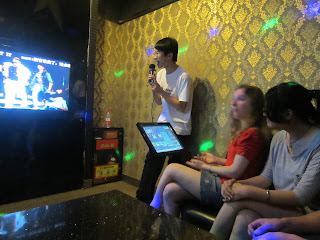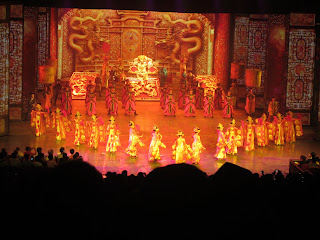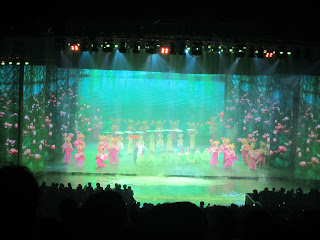My Summer School experience at UNNC lasted for just two weeks. During these two weeks, I had one of most fun and mentally stimulating experiences I've ever had. I was fully immersed into the Chinese culture, surrounded by Mandarin speakers and learning about China's history, politics, society and economy every day, every hour, every minute.
From
the moment I stepped onto Chinese grounds, I knew that my prior thoughts about
China were about to be changed. The Shanghai Pudong Airport welcomed me with a
surprisingly spacious, clean and vibrant airport lounge, whilst I waited for the
pick-up bus to UNNC. After 3 hours of waiting eagerly on the mini bus to arrive
at Ningbo, we knew we were finally there as we passed the Chinese version of
our Trent Building clock. We immediately had to attend a welcome meal at a
restaurant inside the university with our fellow summer school colleagues and a
couple of the lecturers from the business course. What a welcome meal it was!
Around 40 students from the University of Nottingham as well as various other
universities from across the globe gathered together to have a Chinese style
dinner, where there were numerous different dishes to try.

We all knew that even 40 of us would
not be able to finish the huge display of dishes, but this was just one of the
aspects of the extravagant Chinese culture that we were about to experience.
One of my first thoughts of my first
day in China was that the people here are so welcoming and friendly. The
Chinese students are very helpful and approachable so if we need any assistance
with anything we can easily go and find them, also, the course conveners are
very interested about all of us and wanted to hear about where we come from and
what we study as well as what we want to learn about China. Not only that, all
of the summer school students here are also very friendly since we are all here
to meet new people. This all made me feel very comfortable although I was many
miles away from home, I also felt very positive that my trip to China would be
an unforgettable and wonderful one.
The next day, I went to have breakfast
with the students who were able to wake up early and some Chinese buddies. My
breakfast only cost me 11 RMB!
After breakfast, I had a campus tour and then an
introduction lecture to the Summer School at a very posh building. One of the ex-premiers of China had given a speech in that room before! The focus of this lecture was on
safety issues regarding China. I was quite surprised by some of the elements of
this presentation since in the UK, even though we know that we should be
careful on various issues such as crossing roads and fire alarms, it is quite
different in China since they are still a relatively under developed country
compared to the West. One of the aspects that I was particularly surprised
about was that fire alarms are not fitted in every building at UNNC. Perhaps I
was being naïve at that moment in time, but I did not expect that to be the
case in UNNC, although I did expect it to be like that in other areas of China.
We then had a buffet lunch at the Robin Hood restaurant on campus with all the
students. It was at this time when we met the other people on our course. I was
on the course called “China’s Encounter with the World”, and we had a small but
cosy group. After lunch, we went to visit Tian Yi Library in the Ningbo city,
this is one of the few private libraries in China and its history goes back 400
years. It was very pretty and elegant, however, I was a little disappointed
when I learnt from the Chinese buddies that many “historical” buildings in
China are in fact rebuilt and recreated. This is because many of their
historical buildings were demolished during the Cultural Revolution in 1960s
and also, many were not maintained well.
The
next day was Monday, and it was time for us to begin our lectures and seminars.
I thought the day was so good! Firstly, we had some lectures on Chinese history
including imperial China and Qing Dynasty. I thought that although these
lectures were quite basic due to the time constraint, they were thoroughly
interesting because I have always wanted to learn about the history of China
since I have a Chinese background, with parents from Hong Kong
In the evening, we went to KTV (Karaoke
TV). Karaoke in China is a very popular activity, where you can just pop in to
have a sing when you have nothing to do. People of all ages are very good at
singing and enjoy singing during their spare time. The Chinese buddies said
that they like to come here at least once every two weeks, and you could see
that they were so emotional when they sang their Chinese songs, whereas we
summer school students were quite shy compared to them. Karaoke in China is
very different to karaoke in UK since in UK you would go to a pub and sing old
songs in front of a lot of people who you do not know. On the other hand,
karaoke in China is with people you want to sing in front of, so people feel
more comfortable whilst they sing and have a good time.


The next day was full of lectures, one
of which was a video conference lecture on China’s use of soft power. Soft
power is defined as the attractiveness of countries, as opposed to hard power
which is military and force. It mainly consists of the use of persuasion in
international relations as well as the promotion of a country’s ideas, cultures
and values. Soft power is one of the main priorities of People’s Republic of
China (PRC), whereby it has spent $9bn on it just this year. China’s main motivations
for soft power are to create a stronger international presence and change the
international perceptions of China, so that it can represent a more accurate
picture of itself to the world. Perhaps this summer school in itself is an example of China's soft power. China’s display of soft power was clearly
evident in the Shanghai Expo 2010 as well as the Beijing Olympics 2008, and is
likely to be displayed even more in the future as China grows in power both
economically and politically.
We
went on a trip to Hangzhou the following day. This is the famous ancient city of
China, it used to be the capital city of China during the Song dynasty.
However, after that, emperors and its royal family still returned to Hangzhou
for entertainment and relaxation. We watched a famous theatrical performance
called “A Legend of Romance”, which I was told by the tour guide as one of the
world’s top 3 drama performances.


Surprisingly, it lived up to my expectations
and the reputation that it upholds. It was one of the most mesmerizing performances
I have ever seen, with most beautiful traditional Chinese outfits, elegant dancing
and high-tech stage props; making it so real that it was difficult to believe I
had not actually time travelled a thousand years back to the Song dynasty. I
really enjoyed this performance because it allowed me to experience what life
was like in the royal family during the Song dynasty. I have watched many
historical Chinese films and dramas which are set in the past, but none of these
allowed me to really sense that I was actually inside that period as “A Legend
of Romance” did.
The next few days followed with
lectures and discussions on China’s politics and other controversial and hotly
debated topics. One of the issues that we discussed was whether or not China is
just another imperialist power exploiting Africa’s resources. China has had a
long history of trade links and diplomatic relations with Africa and the Global
South. However, after the cold war ended, Africa became ever more important for
China to increase trade since the Chinese needed to look towards countries
other than USSR and US for natural resources that they required for
industrialisation. The recent development of Chinese-African trade relationship
has caused China to be an increasing influence on Africa’s current political
and economic atmosphere. It could be argued that China is acting in an
exploitative manner towards African countries, however, it could also be argued that there is in fact a
mutually benefiting relationship between the China and African.
During that weekend, I decided to stay
in Ningbo to venture the local areas with a few other students. We visited the
Tianyi Square in Ningbo city centre, which is one of the main shopping
districts in Ningbo.
I was surprised by the large number of international chain
stores that were present; however, we also had the chance to go shopping in a
traditional market area. I preferred this much more to the large chain stores
since they can also be found in London, whereas these small cheap boutique
style shops were unique to China. They were located near a temple area with
traditional Chinese style buildings.
People were everywhere, haggling to each
other, trying on shoes and bags; the atmosphere felt really vibrant and
displayed that this area was the “hustle and bustle” of Ningbo. I thoroughly
enjoyed the experience of haggling because I was able to practice my mandarin
skills as well as gaining a discount from the prices that the sellers set. In
UK, there are not any opportunities for people to bargain and haggle whilst
shopping so I thought this was a fun yet unusual experience.
A few days later, everyone had to
attend an International Student Festival at a high class hotel restaurant which
was organised by the Municipal Government of Ningbo. Some of the Nottingham
students performed songs and dances and students from all over the world such
as America, Australia, Bangladesh, etc., also displayed their artistic skills.
Of course, there was a large range of delicious food. The next day of the
International Student Festival, I had to do a speech based on the topic of how
university students face up to the challenges of globalisation, to other
international students and their teachers.
I firstly explained the definition of
globalisation, and then went on to discuss the effects of globalisation on
specifically, university education systems across the world. It was a great
opportunity for me to develop my presentation skills and speaking to a large crowd, despite being such as shorty and almost not being tall enough to see my notes!
On the last day of summer school, we
went on a trip around the outskirts of Ningbo, which was also organised by the
Municipal Government of Ningbo. It was a great opportunity to experience what
life is like in China’s countryside. We visited various temples as well as a
boat trip.
The atmosphere was really something that I will not forget in many
years to come. It was so peaceful and the scenery was beautiful, not the
mention the sun was shining on full blast the whole day. After, we went to a
traditional Ningbonese restaurant to have our farewell dinner and the day ended
with some drinks with the Chinese buddies by the lake back at campus.
Summer school at Ningbo has provided
me with an experience that I am certain I will not forget. I have learned and
gained a lot from being in China and being able to see first-hand what life is
like as a Chinese student. Not only have I been able to see a lot, I have also
been able to make international friends of whom I am sure I will make effort to
see again in the future. In fact, many of them are coming to Nottingham to do a year abroad! I can't wait to meet up with them. I thank University of Nottingham for giving me this
opportunity and the scholarship to fund my travels, for I am sure that had I
not received this scholarship, I would not have been able to explore China
as I did during summer school this year.














